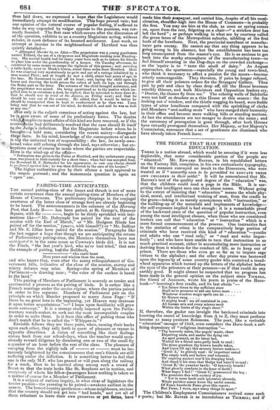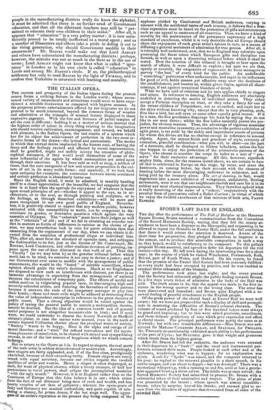THE PEOPLE THAT HAS FINISHED ITS EDUCATION.
THERE is a notion abroad, which would be amusing if it were less deplorable, that some considerable portion of the people are " educated." Mr. EDWARD BAINES, in his republished letters on the Factory Bill, complains, in his own enthusiastic typography, that the measure conveyed an insult to the Dissenters, who were treated as if " unworthy even to be permitted TO EDUCATE THEIR OWN CHILDREN in their midst." It will be remembered that Mr.. BAINES's test of the quality and degree of the " education" was, that the children could read a page in the Bible. It is sur- prising that intelligent men can thus abuse terms. Without going to the extent of insisting that " education" means the whole phy- sical, moral, and intellectual training of man, from the cradle to the grave—taking it as merely synonymous with "instruction," or the building-up of the materials and implements of knowledge— the self-exposure implied is bad enough : it is a remarkable proof, of the backward state of the question of popular instruction, even among the most intelligent classes, when those who are considered leaders can call that " education " or " instruction " which is a mere formal commencement of the process. One instructive fact in the statistics of crime is the comparatively large portion of criminals who have received this kind of " education "—youths and adults who can " read only," or " read and write imper- fectly " ; and who have been unable to turn that instruction to so much practical account, either in accumulating more instruction or deriving from it wisdom for the conduct of life, as to keep out of prison. There are those who even go so far as to impute sage virtues to the alphabet ; and the other day praise was bestowed upon the ingenuity of some country gaoler who contrived a tread- wheel apparatus which turned up the letters of the alphabet before the eyes of the prisoners at their penance—as if that could do any earthly good. It might almost be suspected that no progress has been made in the general opinion on the subject since TICRELL, the friend of ADDISON, wrote his poem in praise of the Horn- book—" learning's first cradle, and its last abode "- " Yet future times to thy sufficient store
Shall ne'er presume to add one letter more . . . . Whatever wonders magic spells can do . . . .
Or Horace sung O mighty book ! are all contained in you. All human arts and every science meet Within the limits of thy single sheet."
If, therefore, the gaoler can inveigle the hardened criminals into knowing the round of knowledge from A to Z, they must perforce become so many penitent Solomons. The poet, like a veritable " education"-monger of 1843, even considers the Horn-book a suf- ficing depository of "religious instruction "— 4 Thy heavenly notes, like angels' music, cheer
Departing souls, and soothe the dying ear. An aged peasant, on his latest bed, Wished for a friend some godly book to read : The pious grandson thy known handle takes, And (eyes lift up) this savoury lecture makes,- ' Great A,' he gravely read : th' important sound The empty walls and hollow roof rebound; Tb' expiring ancient rear'd his drooping bead, And thank'd his stars that Hodge bad learn'd to read :
Great B,' the yoanker bawls: ' 0 heavenly breath!
What ghostly comforts in the hour of death!
What hopes I feel !" Great C,' pronounced the boy : The grandsire dies with ecstasy of joy. "Yet in some lands such ignorance abounds, Whole parishes scarce know thy useful sounds. Of Essex hundreds Fame gives this report; But Fame, I ween, says many things in sport."
The Children's Employment Commissioners revived some such
r 'ports; but Mr. BAINES is as incredulous as Ticxxxx; and if
people in the manufacturing districts really do know the alphabet, it must be admitted that there is no further need of Government education, and that all the dilettanti teachers may still be " per- mitted to educate their own children in their midst." After all, it appears that " education" is a very paltry matter : it is now satis- factorily proved to be totally ineffectual as a moral agent ; and as a number of Dissenters and others take a pride in doling it out to the rising generation, why should Government meddle in their amusement ? Mr. BAINES would make out that Lord ASHLEY and others have calumniated the manufacturing districts : perhaps, however, the mistake was not so much in the facts as in the use of terms; Lord ASHLEY might not know that what is called " igno- rance" in London or in his own circle is called " education" in Leeds and among Mr. BAINES'S circle. If so, the philanthropical nobleman has only to read BAINES by the light of TICKELL, and to confess that Yorkshire is saturated with learning and. morality.



























 Previous page
Previous page